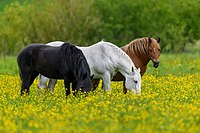Equine coat colour

Horses come in many different colours just like people have different hair and eye colours. Some horses are brown, some are black, some are white, and some have spots.
These colours are determined by something called genetics, which is like a special code inside the horse's body that tells it what colour to be. Just like you might have genes from your parents that determine your hair and eye colour, horses also get their coat colour genes from their parents.
There are a lot of different genes that determine a horse's coat colour, but one of the most important ones is called the "base coat colour gene." This gene decides whether the horse will be black, brown, or chestnut (which is like a reddish-brown colour).
Another gene that affects coat colour is called the "extension gene." This gene tells the horse how much black pigment to produce in its coat. If a horse has a lot of this gene, it will have a black coat. If it has just a little, it will have a brown coat. And if it doesn't have this gene at all, it will have a chestnut coat.
Other genes can add a lot of variety to a horse's coat colour. For example, there's a gene that can cause a horse to have white patches on its coat. There's also a gene that causes a horse to have a "roan" coat, which means they have a mix of white and coloured hairs all over their body.
So in short, a horse's coat colour is determined by a combination of genetic factors that are passed down from its parents.
These colours are determined by something called genetics, which is like a special code inside the horse's body that tells it what colour to be. Just like you might have genes from your parents that determine your hair and eye colour, horses also get their coat colour genes from their parents.
There are a lot of different genes that determine a horse's coat colour, but one of the most important ones is called the "base coat colour gene." This gene decides whether the horse will be black, brown, or chestnut (which is like a reddish-brown colour).
Another gene that affects coat colour is called the "extension gene." This gene tells the horse how much black pigment to produce in its coat. If a horse has a lot of this gene, it will have a black coat. If it has just a little, it will have a brown coat. And if it doesn't have this gene at all, it will have a chestnut coat.
Other genes can add a lot of variety to a horse's coat colour. For example, there's a gene that can cause a horse to have white patches on its coat. There's also a gene that causes a horse to have a "roan" coat, which means they have a mix of white and coloured hairs all over their body.
So in short, a horse's coat colour is determined by a combination of genetic factors that are passed down from its parents.
